Manhattan, with bonus musical slideshow
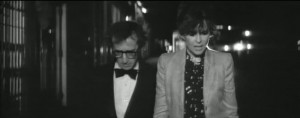 Though it might have been his open plea to loosen monogamy’s grip on society, sex columnist Dan Savage’s veritable mantra that “all relationships end, except the one that doesn’t,” is oddly logical. At first it seems callous and cynical, relying on the notion that we all die alone, but, apart from ignoring the notion of successful bigamists, it makes a lot of sense. Why do we put so much stock in every relationship when 99% of them will end eventually, and unhappily at that?
Though it might have been his open plea to loosen monogamy’s grip on society, sex columnist Dan Savage’s veritable mantra that “all relationships end, except the one that doesn’t,” is oddly logical. At first it seems callous and cynical, relying on the notion that we all die alone, but, apart from ignoring the notion of successful bigamists, it makes a lot of sense. Why do we put so much stock in every relationship when 99% of them will end eventually, and unhappily at that?
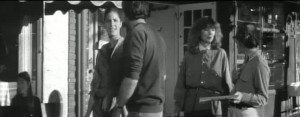 You could then make the case that this notion of the pointlessness of relationships is the very subject of every romantic movie ever made, whether they acknowledge it or not. Imagine the films that end happily with the guy and the girl going off into the sunset, or on the plane to go to art school in Paris, or into space to colonize Venus. What happens to them five minutes after the cameras stop capturing their actions? What about five weeks later?
You could then make the case that this notion of the pointlessness of relationships is the very subject of every romantic movie ever made, whether they acknowledge it or not. Imagine the films that end happily with the guy and the girl going off into the sunset, or on the plane to go to art school in Paris, or into space to colonize Venus. What happens to them five minutes after the cameras stop capturing their actions? What about five weeks later?
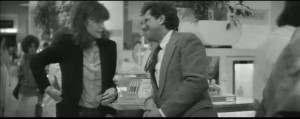 Dealing with these frequently unexplored issues is one of the many fascinating issues at the center of Woody Allen’s Manhattan. When Allen’s character Isaac confronts his friend Yale (Michael Murphy) about his romantic dalliances with Diane Keaton’s Mary, he rants about the meaninglessness of it all, that all we have is our legacy. Isaac points to a skeleton of an ape, and compares humanity to him, “he was probably one of the good looking ones,” which is the perfect statement for the self-involved Isaac, since the ape looks a whole lot like him (especially the cheek bones and glasses). His point is that since no one is going to remember us in 100 years, it would be best to behave properly and have an immaculate reputation.
Dealing with these frequently unexplored issues is one of the many fascinating issues at the center of Woody Allen’s Manhattan. When Allen’s character Isaac confronts his friend Yale (Michael Murphy) about his romantic dalliances with Diane Keaton’s Mary, he rants about the meaninglessness of it all, that all we have is our legacy. Isaac points to a skeleton of an ape, and compares humanity to him, “he was probably one of the good looking ones,” which is the perfect statement for the self-involved Isaac, since the ape looks a whole lot like him (especially the cheek bones and glasses). His point is that since no one is going to remember us in 100 years, it would be best to behave properly and have an immaculate reputation.
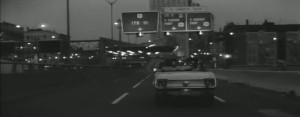 Yes, that’s a still a narcissistic statement and but its yearning for purity and preserving history is doubly humorous considering how much of Manhattan is discarded material from Annie Hall. You see, Annie Hall was originally a 3 hour film (most Allen films fall in the 85-90 minute range), and Allen became frustrated with the lack of focus in the movie, then titled Anhedonia, which means the inability to experience pleasure. Allen cut the film in half and decided to focus on Diane Keaton’s titular character, who was only a supporting player in the longer version of the movie. You can still see some of the connective tissue from Annie Hall throughout Manhattan. For instance, a scene where Mary and Isaac get out of a cab has the very same feel of the lead-up to the moment in Annie Hall where Woody Allen watches Diane Keaton perform Seems Like Old Times at a local bar. And the proliferation of driving scenes as transitions, a technique that Allen used in Annie Hall but completely abandoned after Manhattan (it’s hard to remember a single moment in any Allen film of the last 30 years where his character is driving a car or, apart from cabs, a passenger in one), with the camera following the characters on a highway from behind, allowing Allen to ADR in plot points and dialogue that he hadn’t written until the editing room. He’s able to fill in the gaps that existed because of having to create new characters and situations, but still maintaining a similar point-of-view.
Yes, that’s a still a narcissistic statement and but its yearning for purity and preserving history is doubly humorous considering how much of Manhattan is discarded material from Annie Hall. You see, Annie Hall was originally a 3 hour film (most Allen films fall in the 85-90 minute range), and Allen became frustrated with the lack of focus in the movie, then titled Anhedonia, which means the inability to experience pleasure. Allen cut the film in half and decided to focus on Diane Keaton’s titular character, who was only a supporting player in the longer version of the movie. You can still see some of the connective tissue from Annie Hall throughout Manhattan. For instance, a scene where Mary and Isaac get out of a cab has the very same feel of the lead-up to the moment in Annie Hall where Woody Allen watches Diane Keaton perform Seems Like Old Times at a local bar. And the proliferation of driving scenes as transitions, a technique that Allen used in Annie Hall but completely abandoned after Manhattan (it’s hard to remember a single moment in any Allen film of the last 30 years where his character is driving a car or, apart from cabs, a passenger in one), with the camera following the characters on a highway from behind, allowing Allen to ADR in plot points and dialogue that he hadn’t written until the editing room. He’s able to fill in the gaps that existed because of having to create new characters and situations, but still maintaining a similar point-of-view.
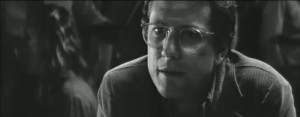 And it’s lucky that creating new characters was what he was forced to do, because Manhattan is his most fully realized film, especially in the way perspectives are developed. It’s the rare movie that can be watched from a number of different points-of-view, Isaac’s, Mary’s, Yale’s, Mariel Hemingway’s Tracy (Isaac’s 17 year old girlfriend), or Meryl Streep’s Jill (Isaac’s ex-wife, who is now a lesbian) without feeling cheated.
And it’s lucky that creating new characters was what he was forced to do, because Manhattan is his most fully realized film, especially in the way perspectives are developed. It’s the rare movie that can be watched from a number of different points-of-view, Isaac’s, Mary’s, Yale’s, Mariel Hemingway’s Tracy (Isaac’s 17 year old girlfriend), or Meryl Streep’s Jill (Isaac’s ex-wife, who is now a lesbian) without feeling cheated.
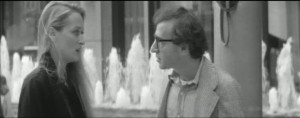 Streep was just coming off making The Deer Hunter, a part she didn’t want and only took to be with her dying lover, John Cazale. Cazale* died in March of 1978, right around the time Allen won his Oscars for Annie Hall and not long before he began shooting Manhattan. Her anger and sadness is clearly evident, her strident words towards Isaac are not those of someone creating drama for the sake of drama (or simply to move the plot forward, as in Midnight in Paris) as other Woody Allen characters tend to do.
Streep was just coming off making The Deer Hunter, a part she didn’t want and only took to be with her dying lover, John Cazale. Cazale* died in March of 1978, right around the time Allen won his Oscars for Annie Hall and not long before he began shooting Manhattan. Her anger and sadness is clearly evident, her strident words towards Isaac are not those of someone creating drama for the sake of drama (or simply to move the plot forward, as in Midnight in Paris) as other Woody Allen characters tend to do.
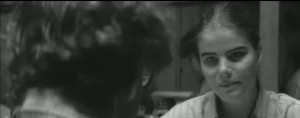 Hemingway (supposedly a stand-in for Allen’s relationship with Stacey Nelkin, who later appeared in Bullets Over Broadway) has the most difficult prospect because she has to appear mature and naïve at the same time. She’s occasionally a counterpoint to Mary’s flaky, vulgar, overly sensitive, secretly conservative, uptight, and pseudo-intellectual Philadelphian character (the most accurate portrayal of a native of Philadelphia in film history). At other times, Hemingway is supposed to symbolize what Isaac loves about Manhattan as a place, exemplified by his opening monologue over gorgeous skyline shots of the city while the bombast of George Gershwin plays on the soundtrack. Tracy is represented by the fireworks that explode in slow motion during the final image of the opening, lingering in a way that makes them look like ethereal or beautiful alien figures. Tracy is more than a representational being though, and she straddles the purity line beautifully when she mutters and over-enunciates under her breath that her thoughts are “not filthy.” Hemingway never appeared more assertive and girlish in her entire career. It’s always been a strange irony that her choice to get breast implants so she could play the murdered Playboy playmate Dorothy Stratten in Bob Fosse’s Star 80, because she wanted to look less like a little boy (though she towers over Isaac). Since then, she has done nothing but become more masculine, adopting a deep voice and other mannish characteristics. It’s funny that one of her most emotive scenes in Manhattan has her saying that she doesn’t understand people who get plastic surgery, and that they should “age naturally.”
Hemingway (supposedly a stand-in for Allen’s relationship with Stacey Nelkin, who later appeared in Bullets Over Broadway) has the most difficult prospect because she has to appear mature and naïve at the same time. She’s occasionally a counterpoint to Mary’s flaky, vulgar, overly sensitive, secretly conservative, uptight, and pseudo-intellectual Philadelphian character (the most accurate portrayal of a native of Philadelphia in film history). At other times, Hemingway is supposed to symbolize what Isaac loves about Manhattan as a place, exemplified by his opening monologue over gorgeous skyline shots of the city while the bombast of George Gershwin plays on the soundtrack. Tracy is represented by the fireworks that explode in slow motion during the final image of the opening, lingering in a way that makes them look like ethereal or beautiful alien figures. Tracy is more than a representational being though, and she straddles the purity line beautifully when she mutters and over-enunciates under her breath that her thoughts are “not filthy.” Hemingway never appeared more assertive and girlish in her entire career. It’s always been a strange irony that her choice to get breast implants so she could play the murdered Playboy playmate Dorothy Stratten in Bob Fosse’s Star 80, because she wanted to look less like a little boy (though she towers over Isaac). Since then, she has done nothing but become more masculine, adopting a deep voice and other mannish characteristics. It’s funny that one of her most emotive scenes in Manhattan has her saying that she doesn’t understand people who get plastic surgery, and that they should “age naturally.”
 Keaton’s Mary starts in the hole right away for us, until you realize that it doesn’t matter if you like any of these people. The nice people in Manhattan (Tracy, Yale’s wife, Jill’s girlfriend) get the brunt of the low down behavior, so it’s the revealing moments that are sacrosanct for the actors. Mary has a scene where she sarcastically chastises Yale for the authoritative sound of his voice while he breaks bad news to her, like he was “the pope or the robot from 2001.” She’s annoyed with him, but the joke is that she really does see people like the pope as authoritative, and her WASPiness is a subtext in every scene.
Keaton’s Mary starts in the hole right away for us, until you realize that it doesn’t matter if you like any of these people. The nice people in Manhattan (Tracy, Yale’s wife, Jill’s girlfriend) get the brunt of the low down behavior, so it’s the revealing moments that are sacrosanct for the actors. Mary has a scene where she sarcastically chastises Yale for the authoritative sound of his voice while he breaks bad news to her, like he was “the pope or the robot from 2001.” She’s annoyed with him, but the joke is that she really does see people like the pope as authoritative, and her WASPiness is a subtext in every scene.
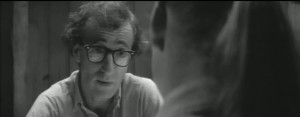 Isaac is probably the least masked version of Woody Allen as a person, especially during the opening monologue which plays like a rebuttal to Taxi Driver and Travis Bickle’s trashing of NYC as a filthy place that needs to be wiped clean. The fact that the moments Isaac spends by himself reveal all the fear inherent to everything that comes out of his mouth (everything causes cancer), as his idea for a sitcom being about a bunch of neurotic people who create problems in their lives so they can avoid dealing with the big picture. Jerry Seinfeld was obviously taking notes during that scene. And when Wallace Shawn appears late in Manhattan, his arrival is the joke itself, but he buries the lede when he informs Mary and Isaac that he’s in town to give a “symposium on semantics.” What could be more appropriate for a movie about people who like to ruin their perfectly happy relationships for, just because, while they reach for reasons to justify it?
Isaac is probably the least masked version of Woody Allen as a person, especially during the opening monologue which plays like a rebuttal to Taxi Driver and Travis Bickle’s trashing of NYC as a filthy place that needs to be wiped clean. The fact that the moments Isaac spends by himself reveal all the fear inherent to everything that comes out of his mouth (everything causes cancer), as his idea for a sitcom being about a bunch of neurotic people who create problems in their lives so they can avoid dealing with the big picture. Jerry Seinfeld was obviously taking notes during that scene. And when Wallace Shawn appears late in Manhattan, his arrival is the joke itself, but he buries the lede when he informs Mary and Isaac that he’s in town to give a “symposium on semantics.” What could be more appropriate for a movie about people who like to ruin their perfectly happy relationships for, just because, while they reach for reasons to justify it?
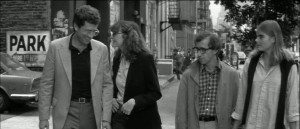 * Cazale famously had the greatest small resume of films of all time. He appeared in 5 movies, all of them nominated for Best Picture, 3 of which won. [Dog Day Afternoon, The Godfather I and II, The Deer Hunter, and The Conversation.]
* Cazale famously had the greatest small resume of films of all time. He appeared in 5 movies, all of them nominated for Best Picture, 3 of which won. [Dog Day Afternoon, The Godfather I and II, The Deer Hunter, and The Conversation.]
Enjoy a slideshow of images from Manhattan, scored to George Gershwin’s Rhapsody in Blue, the same song that opens the film. The quality of the image is a little lower than that of DVD, because it comes from the laserdisc, the only home video version that is actually in the correct aspect ratio, so there’s about 15% more picture. The DVD was haphazardly cropped to 2.30, the Blu-ray is a little better at 2.33, but this laserdisc is 2.55.



